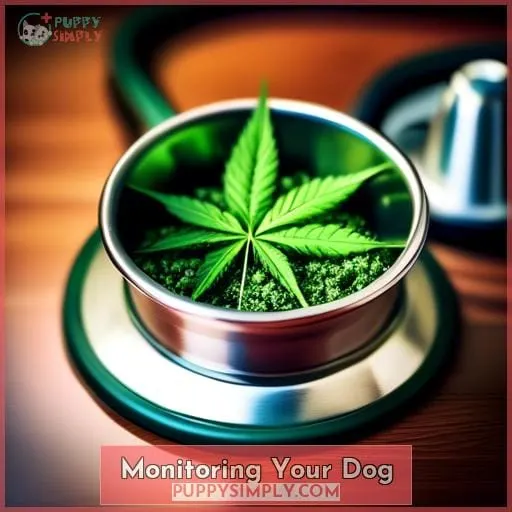This site is supported by our readers. We may earn a commission, at no cost to you, if you purchase through links.
 Considering giving CBD to your dog? You’re likely seeking assurance on its safety, potential health benefits, and proper dosing. While research is still emerging, anecdotal evidence suggests CBD can aid in managing pain, anxiety, and other conditions in dogs.
Considering giving CBD to your dog? You’re likely seeking assurance on its safety, potential health benefits, and proper dosing. While research is still emerging, anecdotal evidence suggests CBD can aid in managing pain, anxiety, and other conditions in dogs.
This guide delves into the scientific understanding of CBD, legal considerations, and veterinarian insights. Ensuring you’re well-informed to make the best decision for your furry friend’s well-being.
Yes, it is generally safe to give CBD to your dog, but it’s important to use pet-specific CBD products that are THC-free and to follow proper dosage guidelines. Always consult with a veterinarian before starting any new supplement for your pet.
Table Of Contents
- Key Takeaways
- Understanding CBD
- Legal Considerations
- Safety of CBD for Dogs
- Benefits of CBD in Dogs
- Veterinarians’ Perspective
- Dosage Guidelines
- Choosing Quality CBD
- Administration Methods
- Monitoring Your Dog
- Alternatives to CBD
- Frequently Asked Questions (FAQs)
- How does the metabolism of CBD differ between dogs and humans, and what implications does this have for dosing?
- Can CBD interact with other medications my dog is currently taking, and how should I manage these interactions?
- Are there any specific breeds or types of dogs that should avoid CBD due to genetic predispositions or health concerns?
- How does the form of CBD (oil, chew, capsule) affect its absorption and efficacy in dogs?
- What are the long-term effects of regular CBD use in dogs, and are there any studies tracking these outcomes?
- Conclusion
Key Takeaways
- CBD is generally well-tolerated by healthy dogs, with studies showing a good safety profile for a range of doses over a 28-day period. However, higher doses may cause mild gastrointestinal side effects and increase ALP levels, which could indicate liver enzyme changes.
- While CBD holds promise for various therapeutic benefits in pets, including pain relief, anxiety reduction, and improved mobility, it’s essential to consult with a veterinarian before starting any CBD regimen, especially for pets with pre-existing health conditions or those on other medications.
- The legal landscape for CBD in pets is complex, with federal law allowing hemp-derived CBD containing 0.3% THC or less. However, state laws vary, and the FDA has not approved CBD products for pets, except for one prescription drug, highlighting the importance of researching specific regulations and ensuring product quality and safety.
- Dosage and quality of CBD products are critical considerations for pet safety. Starting with a low dose and gradually adjusting is recommended, and choosing high-quality, third-party tested CBD products specifically formulated for pets can help minimize risks and ensure efficacy.
Understanding CBD
When considering CBD for your dog, it’s important to understand what CBD oil is and how it works.
CBD, or cannabidiol, is a compound found in cannabis and hemp that interacts with the endocannabinoid system in the body.
This system regulates key physiological processes, and CBD’s interaction with it can influence various functions, potentially leading to health benefits for your pet.
What is CBD Oil?
Exploring the benefits and applications of CBD oil for dogs involves understanding its composition and how it interacts with their bodies. CBD oil is extracted from cannabis or hemp plants, with methods like CO2 extraction ensuring purity and potency.
It’s crucial to consider bioavailability factors, as oral CBD has shown less than 19% bioavailability in dogs. When choosing CBD products, consider the varieties available and their potential drug interactions.
Long-term efficacy studies are ongoing, but initial research shows promise for conditions like pain and anxiety.
How Does CBD Work?
CBD interacts with your dog’s endocannabinoid system, regulating various physiological processes to maintain balance and health.
This Endocannabinoid Mechanism involves CBD binding to endocannabinoid receptors in the central and peripheral nervous systems.
Such interactions offer Therapeutic Potential, leading to Biological Effects that may benefit your dog’s well-being.
Clinical Applications and Pharmacological Insights continue to evolve, enhancing our understanding of CBD’s role in canine health.
Legal Considerations
When considering giving CBD to your dog, it’s crucial to understand the legal landscape. The federal legal status of CBD, potential risks of veterinarian disciplinary action, variability in state laws, and the FDA’s regulatory position all play significant roles.
These factors can significantly influence the legality and safety of CBD products for pets, making it essential for pet owners to stay informed and cautious.
In order for CBD to be legal for your pet, it has to be legal both federally and in your state. Hemp and hemp-derived CBD are federally legal to produce. However, under the FDA and AAFCO’s ruling, CBD and hemp are federally illegal as pet food ingredients.
States have their own individual laws, and this includes specific Controlled Substances Acts for each state. It takes time for state law to catch up to federal law, and that’s true in the case of CBD legality as well.
Some states haven’t decided that CBD is illegal, but they have specific rules around the substance and how it can be made, purchased, and used. Some have legalized it only for medical purposes, or have only legalized CBD that is certified THC-free.
The American Veterinary Medical Association says on their website in no uncertain terms, “State laws legalizing use in people do not apply to cannabis use in animals.” Even if a veterinarian fully supports CBD use in pets and is aware of the benefits of hemp-derived CBD, discussing it with you could put their medical license at risk in most states.
While it’s always important to discuss your pet’s health plan with your veterinarian, be prepared for some wariness around the topic of CBD for pets. Just remember that this is a protective legal measure for veterinarians, and you should do your own independent research while considering their advice.
The long and short of it? People using CBD for pets in these states need to be careful, consult their veterinarian, and read up on the laws carefully. Especially because these states are still figuring out how CBD for humans works within their laws, the rules around pet CBD are going to be even more confused and complex.
Federal Legal Status
While understanding CBD’s interaction with the endocannabinoid system is crucial, you’ll also need to navigate the complex federal legal status of CBD for pets.
- Federal Legal Status: CBD derived from industrial hemp (containing 0.3% THC or less) is federally legal for pets.
- State Laws: States may have varying regulations on CBD for pets, so it’s essential to check your state’s specific laws.
- Veterinary Considerations: Veterinarians face legal implications when recommending or selling hemp-derived CBD products for pets.
Veterinarian Disciplinary Risk
Despite the federal legalization of hemp-derived CBD under the 2018 Farm Bill, veterinarians face a complex legal landscape when considering its recommendation for pets, as you’ll need to navigate both state and federal regulations.
While you may be interested in the potential benefits of CBD for dogs, such as its ability to support mobility, relieve pain, and reduce anxiety, you must also be aware of the potential risks and ethical concerns involved.
The legal implications of discussing or recommending CBD can lead to professional liability and issues with regulatory compliance. Veterinarians may risk disciplinary action for prescribing or even discussing cannabis products due to the current federal stance on CBD as an unapproved drug for animals.
It’s crucial to consult with legal experts to ensure adherence to all applicable laws and to protect your professional standing while considering CBD safety for dogs, potential CBD side effects for dogs, and the possibility of an adverse reaction.
State Law Variability
The complexity of state-specific regulations adds another layer to the conversation about the use of CBD for your dog, as you’ll need to navigate these laws carefully.
The legal landscape for CBD products, including hemp-derived CBD with less than 0.3% THC, varies significantly across the United States. While some states have aligned their laws with federal regulations, others maintain their own sets of rules, creating a patchwork of legislative variability.
For instance, certain states only permit the use of THC-free CBD, while others haven’t fully legalized CBD for pets or humans. The American Veterinary Medical Association highlights the importance of understanding regional laws and statutory differences when considering CBD for your pet.
Always consult with your veterinarian and check the latest state regulations to ensure compliance and safety. If you encounter any adverse reactions, the Pet Poison Helpline is available for assistance.
FDA Regulatory Position
You’ll find that the FDA’s stance on CBD is particularly relevant as it directly impacts the legal considerations surrounding its use in pets.
- FDA Regulations: The FDA hasn’t approved CBD products for pets, except for one prescription drug for epilepsy in children.
- Safety Standards: Concerns about CBD’s safety for animals and humans consuming animal products (meat, milk, eggs) fed CBD.
- Clinical Trials: Lack of FDA-approved clinical trials to establish the efficacy and safety of CBD for pets.
- Product Labeling: Strict requirements for CBD product labels to ensure consumer safety and product quality.
- Quality Assurance: The FDA warns against unapproved CBD products due to potential safety risks and lack of quality assurance.
The FDA’s cautious approach underscores the importance of consulting with a veterinarian before giving CBD to pets and choosing products carefully.
Safety of CBD for Dogs
In studies, CBD has shown to be well-tolerated by healthy dogs, even at moderate levels, with mild side effects like gastrointestinal upset reported.
Research indicates that CBD products containing less than 0.3% THC are generally safe for dogs, with low acute toxicity levels and a favorable safety profile in both healthy and diseased animals.
It’s essential to consult with a veterinarian before giving your dog CBD, as individual responses may vary, and long-term effects of CBD on canine health are still being studied.
Hemp Vs. Marijuana-derived CBD
When transitioning from the legal considerations surrounding CBD use in pets, it’s crucial to understand the distinction between hemp-derived and marijuana-derived CBD, as this difference significantly impacts the safety and legality of CBD products for your dog.
Hemp-derived CBD, which contains less than 0.3% THC, is generally considered safe for pets and is the type of CBD most commonly recommended for them.
| Aspect | Hemp-derived CBD | Marijuana-derived CBD |
|---|---|---|
| THC Content | Less than 0.3% | Can be high |
| Legality | Generally legal | Often illegal |
| Safety for Pets | Generally safe | Potentially toxic |
Common Side Effects
While some side effects of CBD in dogs are rare, your pet may experience mild symptoms such as dry mouth, lethargy, or gastrointestinal upset when given improper amounts.
It’s crucial to monitor your dog for any adverse reactions, especially if they’re on other medications, as CBD can influence liver enzymes and drug metabolism.
If you notice any unusual changes, such as increased thirst or drowsiness, consider a dosage adjustment and consult your vet for safety monitoring.
Long-term effects of CBD are still under investigation, but risk assessment is vital, particularly for dogs with conditions like pain, cancer, seizures, arthritis, or anxiety.
Benefits of CBD in Dogs
As you consider CBD for your dog’s health, it’s important to understand its potential benefits. CBD may support your dog’s mobility, offering relief from joint stiffness and promoting flexibility.
It’s also been suggested that CBD can help manage pain and reduce anxiety and stress in dogs, although more scientific research is needed to confirm these effects.
Always consult with your veterinarian before starting any new supplement, including CBD, to ensure it’s safe and appropriate for your pet’s specific health needs.
CBD for Mobility
One of the notable benefits of CBD for dogs is its potential to enhance mobility, especially for those suffering from joint issues and arthritis.
By interacting with the endocannabinoid system, CBD can help maintain joint health, alleviate discomfort, and support overall mobility in dogs.
This is particularly beneficial for aging pets or those with conditions that affect their movement.
CBD for Pain Relief
In managing your dog’s pain, CBD oil has shown promise as a potential treatment. Studies indicate its effectiveness in reducing discomfort associated with conditions like osteoarthritis. Holistic approaches, including CBD for dog arthritis and joint pain, offer natural remedies beyond traditional pharmaceuticals.
Such alternative therapies may support mobility and muscle recovery, positioning CBD as a beneficial herbal solution for your canine companion’s well-being.
CBD for Anxiety and Stress
Transitioning from managing pain, you’ll find that CBD may also offer relief for dogs experiencing anxiety and stress.
CBD’s calming effects can provide essential behavioral support, making it a valuable tool for addressing various behavioral issues. This includes its anti-anxiety impact, which is particularly beneficial for dogs with conditions like epilepsy, enhancing their overall well-being.
Veterinarians’ Perspective
When considering CBD for your dog, veterinarians generally have varying perspectives on its benefits and risks due to legal limitations and lack of definitive research. Veterinary insights often highlight the potential for CBD to alleviate conditions like neuropathic pain and provide anti-inflammatory properties.
However, legal implications restrict vets from prescribing or recommending CBD, even though clinical trials may show promise.
Pet owner education is crucial, as CBD regulation remains unclear. Vets may discuss CBD’s possible anti-nausea effects and appetite stimulation, but they emphasize caution and the need for more evidence.
Always consult with your vet to understand the potential benefits and risks of CBD for your dog’s specific health needs.
Dosage Guidelines
When considering CBD for your dog, it’s crucial to start with an appropriate dosage and adjust as needed over time.
Begin with a low dose based on your dog’s weight, observing their response to find the optimal amount.
Consult with your veterinarian to ensure safety, especially if your dog is on other medications, as CBD can influence liver enzymes and drug metabolism.
Determining Proper Dosage
Given the complexity of CBD’s effects and legal considerations, it’s crucial you start with a low dose for your dog and adjust as needed.
Effective monitoring allows for optimal adjustment, whether you’re using CBD for dog seizures, cancer, skin allergies, digestive issues, or heart disease.
Adjusting Dosage Over Time
After determining the initial dosage for your dog, you’ll need to carefully monitor their response and adjust the amount as necessary to achieve the desired effects.
Gradual titration and an observation period are key.
Make incremental adjustments based on response tracking.
Tailored regimens ensure CBD for dog stress, wellness, relaxation, calming, and nervousness are effectively managed, optimizing your furry friend’s health and comfort.
Choosing Quality CBD
When selecting quality CBD for your dog, it’s crucial to consider third-party testing and the type of CBD extract used. Third-party lab results provide assurance of the product’s potency and purity, ensuring it’s safe for your pet.
Additionally, choosing between full-spectrum and isolate CBD can impact the potential health benefits.
Importance of Third-party Testing
As you transition from understanding dosage guidelines to selecting a quality CBD product for your dog, it’s crucial you look for third-party testing to ensure safety and efficacy. This verification upholds product transparency, providing quality assurance that meets industry standards.
It bolsters consumer confidence, confirming the CBD benefits for dogs touted by CBD brands, treats, chews, and tinctures.
Full-spectrum Vs. Isolate
One must consider the differences between full-spectrum and isolate CBD products when choosing a quality option for their pet. Full-spectrum CBD includes various cannabinoids, potentially enhancing efficacy through the entourage effect.
Isolate, while pure, may lack this synergy.
Extraction methods influence product purity, and bioavailability comparison is crucial, especially when considering CBD for dog kidney, liver, respiratory, neurological diseases, or immune system support.
Administration Methods
After ensuring you’ve selected a high-quality CBD product, the next step is to determine the best way to administer it to your dog. Each method can affect your dog differently, so it’s important to choose one that suits their needs and your lifestyle.
- Oral administration: The most common method, where you can mix CBD oil into your dog’s food or use CBD-infused treats, supporting their physical and mental wellbeing.
- Topical applications: Ideal for localized issues, such as skin conditions or joint pain, these can contribute to long-term health by targeting specific areas.
- Inhalation methods: Less common and not generally recommended for dogs, as it can be difficult to control the dosage and may pose respiratory risks.
Monitoring Your Dog
When introducing CBD to your dog, it’s crucial to start with a small dose and observe your pet’s response. Monitoring your dog’s behavior for any changes can help you assess the effectiveness and safety of the CBD product.
If you notice any adverse reactions, such as lethargy or gastrointestinal upset, consult your veterinarian immediately.
Documenting Behavior Changes
When administering CBD to your dog, it’s crucial to closely monitor and record any changes in their behavior or health.
Keep a detailed behavioral log, noting shifts in mood, activity levels, and signs of discomfort.
Symptom journaling can reveal patterns, indicating how CBD affects your dog’s hyperactivity, bone health, connective tissue support, flexibility, and overall well-being.
Observational notes help track progress and guide future dosing adjustments.
Recognizing Adverse Reactions
You’ll need to keep an eye out for any unusual symptoms that could signal an adverse reaction to CBD in your dog.
- Recognizing Symptoms: Watch for lethargy, excessive drooling, or unusual restlessness.
- Monitoring Health: Observe changes in appetite or behavior.
- Seeking Guidance: Consult your vet if symptoms persist or worsen.
- Understanding Risks: Be aware of interactions with anti-seizure medications or potential impacts on cardiac health.
Alternatives to CBD
While frequently exploring CBD as a solution for your dog’s needs, it’s also important to consider non-CBD alternatives that can offer similar benefits without the potential legal and health uncertainties associated with CBD.
- Natural Supplements: Products like fish oil can support your dog’s overall wellness, including heart health and cognitive function, without the complexities of CBD.
- Dietary Adjustments: Enhancing your dog’s diet with specific nutrients may improve energy levels and support the canine health foundation (CHF), potentially reducing the need for CBD.
- Medications: For certain conditions like epilepsy, traditional medications such as potassium bromide may be effective in managing symptoms and protecting the spinal cord, under veterinary guidance.
Frequently Asked Questions (FAQs)
How does the metabolism of CBD differ between dogs and humans, and what implications does this have for dosing?
Dogs metabolize CBD differently than humans, with a significant hepatic metabolism leading to various metabolites.
This species-specific metabolism means dosing must be carefully adjusted to ensure safety and efficacy for your dog.
Can CBD interact with other medications my dog is currently taking, and how should I manage these interactions?
CBD can interact with medications your dog is taking, potentially altering their effects. Imagine a delicate dance where CBD and other drugs share the stage, sometimes stepping on each other’s toes.
This interaction occurs because CBD is metabolized by the same liver enzymes that process many medications.
Therefore, it’s crucial to consult with your veterinarian before introducing CBD to your dog’s regimen. They can guide you on safe usage and monitor for any adverse reactions, ensuring the health and well-being of your furry friend.
Are there any specific breeds or types of dogs that should avoid CBD due to genetic predispositions or health concerns?
There’s no breed-specific research indicating certain dogs should avoid CBD, but individual health concerns like liver issues may warrant caution.
Always consult your vet before starting CBD.
How does the form of CBD (oil, chew, capsule) affect its absorption and efficacy in dogs?
Like a key fitting a lock, the form of CBD—oil, chew, or capsule—can influence how well it’s absorbed in your dog’s body.
Oils may offer better absorption due to their fat content, enhancing CBD’s bioavailability.
What are the long-term effects of regular CBD use in dogs, and are there any studies tracking these outcomes?
Long-term effects of CBD on dogs aren’t fully understood, with limited studies available.
Consult your vet before starting CBD and monitor your dog’s health closely.
Conclusion
Ironically, while you might worry about giving CBD to your dog, the real danger lies in not being informed.
It’s safe, provided you choose THC-free, pet-specific products and adhere to dosage guidelines.
Consulting with a vet ensures you’re making a well-informed decision for your furry friend’s health.
Whether it’s easing pain, anxiety, or improving mobility, CBD offers a spectrum of benefits.
















